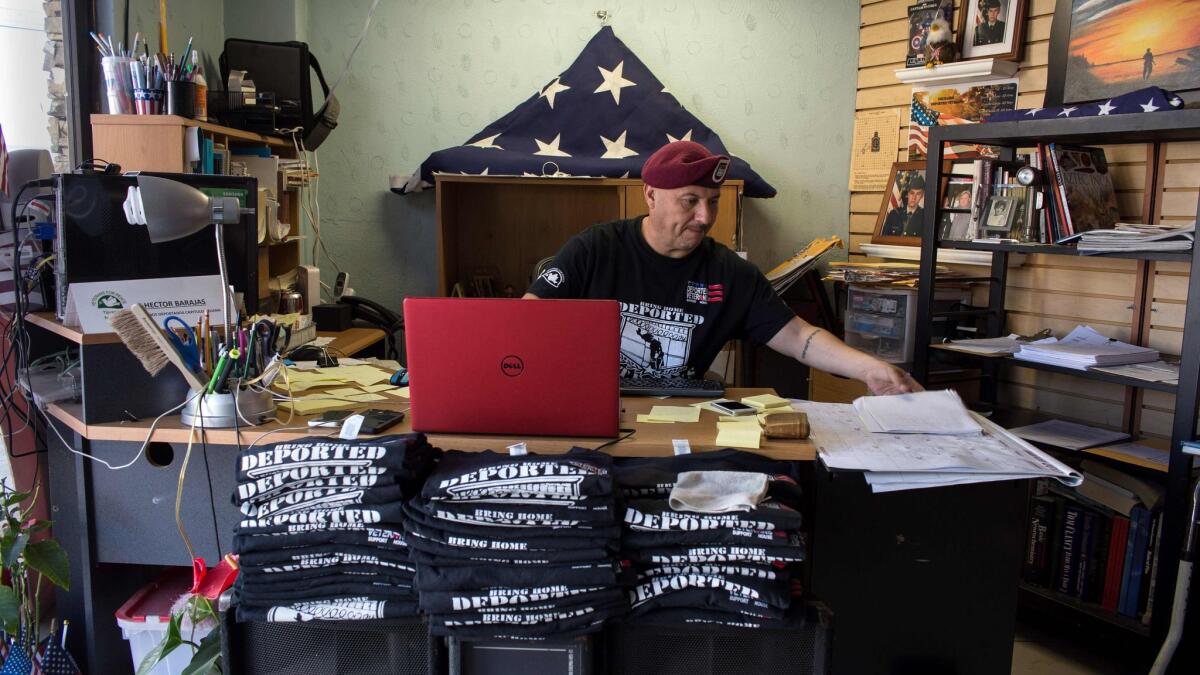Deported veteran’s pardon gives him hope of returning to U.S., but it’s no guarantee

- Share via
Reporting from San Diego — Since learning he’d been pardoned by Gov. Jerry Brown on Saturday, Hector Barajas-Varela, a deported U.S. Army veteran, has more hope that one day he will be able to reenter the country he considers home.
Brown’s pardon for Barajas-Varela and two others — the first time a governor has taken such action for deported veterans — does not guarantee they will be allowed to come back to the U.S. But the pardons may help them in their appeals to federal immigration authorities.
Barajas-Varela, 40, runs a shelter in Tijuana called the Deported Veterans Support House, better known as “the Bunker.” He is well-known in the worldwide community of deported veterans, which includes at least 239 people in 34 countries, according to a report by the American Civil Liberties Union.
“It gives the guys a lot of hope,” Barajas-Varela, who spent more than a year in a California prison on a firearms charge, said in an interview at the Bunker. “Morale has gone up. I know mine did.”
Barajas-Varela’s case is part of a movement to help deported veterans return to the country they served.
In addition to Brown’s weekend pardons, advocates are pushing a bill in Congress that would block the deportation of noncitizen veterans. The legislation would allow those who have been deported to come back to the U.S. as long as they didn’t commit “crimes of violence” or crimes involving national security with sentences of five years or more.
Noncitizens who serve in the military generally are lawful permanent residents who have so-called green cards. They can be deported for committing a list of crimes set in immigration law, which range from certain drug offenses to murder.
Felix Peralta Jr., 54, one of the veterans who gets help from the Bunker, said Barajas-Varela’s pardon and persistence give others hope.
“He doesn’t stop knocking on that door,” Peralta said. “That keeps us alive.”
Barajas-Varela came to the U.S. at age 7 from Mexico. He received a green card a couple of years later. He served in the 82nd Airborne Division of the Army from 1995 to 2001.
“I think the United States is one of the best countries in the world,” Barajas-Varela said. “I lived the American dream.”
At first, he thought joining the Army meant he’d become a citizen, he said. Military members are uniquely allowed to apply for citizenship without any waiting period. They do have to complete all the paperwork and take the tests, but that is not always clear to those who join, according to the report released last summer by the ACLU.
Barajas-Varela said his recruiter pushed the idea of citizenship as part of the perks of joining the Army.
Once he realized he wasn’t a citizen, Barajas-Varela said, he started the process in the late ’90s but never followed through. He takes responsibility for that, he said, but he wishes the military had better informed him about the process.
After he got out of the Army in 2001, it was a matter of months before he ended up in the criminal justice system — taking a plea deal and serving three years in prison for shooting at a car.
“I made bad decisions,” Barajas-Varela said about that time in his life. “I put myself in that situation…. I wouldn’t put myself in that situation again.”
He was deported in 2004 after serving his sentence. He said he felt alone until, years later, he found a support group for deported veterans. He founded the Bunker in 2013.
“I thought I was the only person going through that,” Barajas-Varela said.
Barajas-Varela has an 11-year-old daughter named Liliana who lives in Los Angeles. He talks with her frequently on Skype, he said, but hasn’t seen her in person since she came to see him about a year ago.
“My daughter is the most important thing to me,” he said. “That’s what our fight is for, is to return to our families and our children.”
Barajas-Varela said he also looks forward to voting and to having a house, a bed and a career. For now, he sleeps on a cot in the office of the Bunker while he fundraises for his nonprofit and supports the veterans in his care.
On Monday, Barajas-Varela fielded congratulatory phone calls. “This pardon is not just for me,” he said to a fellow vet deported to Jamaica. “It’s hope for the rest of us.”
Barajas-Varela said he has an application for citizenship pending. A few weeks before his pardon, he received an email from U.S. Citizenship and Immigration Services saying that it would most likely be denied but giving him a chance to submit more information. He hopes the pardon will help his case.
“I think I’m just as American as anyone back home,” Barajas-Varela said.
The federal government recognizes pardons for convictions “only in very limited circumstances” in immigration cases, according to USCIS’s website. The circumstances are not spelled out, and an agency spokeswoman did not respond to requests for comment.
Even if he’s allowed back into the U.S., Barajas-Varela said, he’s committed to running the Bunker for at least another year.
“We know this is not going to stop from one day to the next,” he said.
kate.morrissey@sduniontribune.com
Morrissey writes for the San Diego Union-Tribune
More to Read
Sign up for Essential California
The most important California stories and recommendations in your inbox every morning.
You may occasionally receive promotional content from the Los Angeles Times.













![Vista, California-Apri 2, 2025-Hours after undergoing dental surgery a 9-year-old girl was found unresponsive in her home, officials are investigating what caused her death. On March 18, Silvanna Moreno was placed under anesthesia for a dental surgery at Dreamtime Dentistry, a dental facility that "strive[s] to be the premier office for sedation dentistry in Vitsa, CA. (Google Maps)](https://ca-times.brightspotcdn.com/dims4/default/07a58b2/2147483647/strip/true/crop/2016x1344+29+0/resize/840x560!/quality/75/?url=https%3A%2F%2Fcalifornia-times-brightspot.s3.amazonaws.com%2F78%2Ffd%2F9bbf9b62489fa209f9c67df2e472%2Fla-me-dreamtime-dentist-01.jpg)